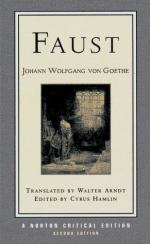[Footnote 27: Donjon. The original is Zwinger, which Hayward says is untranslatable. It probably means an old tower, such as is often found in the free cities, where, in a dark passage-way, a lamp is sometimes placed, and a devotional image near it.]
[Footnote 28: It was a superstitious belief that the presence of buried treasure was indicated by a blue flame.]
[Footnote 29: Lion-dollars—a Bohemian coin, first minted three centuries ago, by Count Schlick, from the mines of Joachim’s-Thal. The one side bears a lion, the other a full length image of St. John.]
[Footnote 30: An imitation of Ophelia’s song: Hamlet, act 14, scene 5.]
[Footnote 31: The Rat-catcher was supposed to have the art of drawing rats after him by his whistle, like a sort of Orpheus.]
[Footnote 32: Walpurgis Night. May-night. Walpurgis is the female saint who converted the Saxons to Christianity.—The Brocken or Blocksberg is the highest peak of the Harz mountains, which comprise about 1350 square miles.—Schirke and Elend are two villages in the neighborhood.]
[Footnote 33: Shelley’s translation of this couplet is very fine: ("O si sic omnia!”)
“The giant-snouted crags, ho! ho!
How they snort and how they blow!”]
[Footnote 34: The original is Windsbraut, (wind’s-bride,) the word used in Luther’s Bible to translate Paul’s Euroclydon.]
[Footnote 35: One of the names of the devil in Germany.]
[Footnote 36: One of the names of Beelzebub.]
[Footnote 37: “The Talmudists say that
Adam had a wife called Lilis before he married Eve,
and of her he begat nothing but devils.”
Burton’s Anatomy of Melancholy.
A learned writer says that Lullaby is derived from “Lilla, abi!” “Begone Lilleth!” she having been supposed to lie in wait for children to kill them.]
[Footnote 38: This name, derived from two Greek words meaning rump and fancy, was meant for Nicolai of Berlin, a great hater of Goethe’s writings, and is explained by the fact that the man had for a long time a violent affection of the nerves, and by the application he made of leeches as a remedy, (alluded to by Mephistopheles.)]
[Footnote 39: Tegel (mistranslated pond by Shelley) is a small place a few miles from Berlin, whose inhabitants were, in 1799, hoaxed by a ghost story, of which the scene was laid in the former place.]
[Footnote 40: The park in Vienna.]
[Footnote 41: He was scene-painter to the Weimar theatre.]
[Footnote 42: A poem of Schiller’s, which gave great offence to the religious people of his day.]
[Footnote 43: A literal translation of Maulen, but a slang-term in Yankee land.]
[Footnote 44: Epigrams, published from time to time by Goethe and Schiller jointly. Hennings (whose name heads the next quatrain) was editor of the Musaget, (a title of Apollo, “leader of the muses,”) and also of the Genius of the Age. The other satirical allusions to classes of notabilities will, without difficulty, be guessed out by the readers.]




